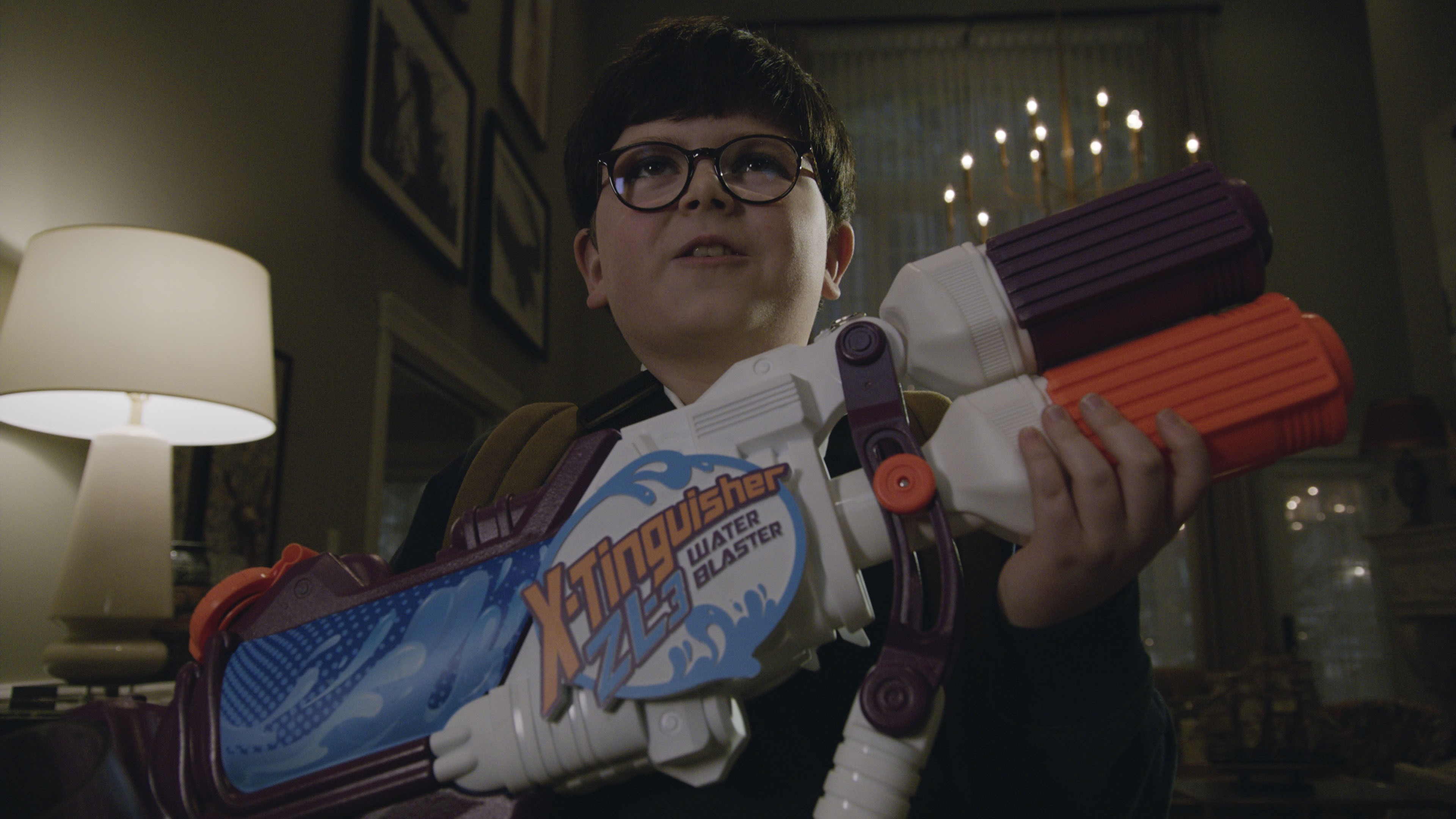What to Watch Verdict
Despite the pedigree of comedians on screen and behind the scenes, this is a film that's best watched just by kids when they're home alone.
Pros
- +
Although its 90-minute running time still seemed interminable, at least the movie is pretty short
Cons
- -
Trying to make everyone sympathetic or "understood" in their motivations was a mistake since we're watching people be beaten and abused within an inch of their lives
- -
The script by Mikey Day and Streeter Seidell entirely sidelines the emotional throughline of the original idea by giving the left behind kid's mother Carol (Aisling Bea) zero obstacles to get back to him except the change in time zones during a cross-Atlantic flight
Home Sweet Home Alone is a movie that wants to have its cake and also bake an anvil in it to drop on an adult’s head, a perhaps unexpected barometer for how much physical abuse a real person can or should suffer in the name of comedy storytelling. Its argument is that the threshold is very high, as if what Kevin McAllister did to the Wet Bandits back in 1990 was a quaint demonstration of self-defense and we’re now at a place where alleged transgressors should be mauled, mutilated or crippled with extreme prejudice. But 2021 is also an era in which both good guys and bad guys must be given understandable, possibly sympathetic motivations, so you can’t just have characters that are capital-T thieves or even Wile E. Coyote level schemers — which makes it more difficult to watch them get throttled over and over by a 10-year-old.
All of which is to say that the sixth(!) film in the Home Alone franchise is an insufferable slog, an excruciating exercise in physical comedy that you may or may not be surprised to discover that the director of Dirty Grandpa did not inject with the same sweetness or humanity that made the original such an enduring holiday favorite.
Although Jojo Rabbit co-star Archie Yates makes a more than suitably adorable stand-in for Macaulay Culkin’s left-behind kid, Ellie Kemper and Rob Delaney are not up to the task of balancing their characters’ simultaneous middle-class vulnerability and villainous desperation as a script by Mikey Day and Streeter Seidell tries to mine humor from a scenario that could have been resolved if either party had paused for literally five seconds to have a conversation.
Yates plays Max Mercer, a young boy left home alone when the airline carrying him and his extended family to Tokyo for the holidays rebooks the group on two different planes, causing his mother Carol (Aisling Bea) to leave the country without bothering to check on him or apparently even say goodbye. Because he hates his American relatives — an understandable feeling since his Uncle Blake (Pete Holmes) manages his own kids like he’s herding cats — Max is initially chuffed to be by himself; within five minutes of discovering that everyone is gone, he pillages every cabinet, cupboard and closet for things to eat, play with or watch that he wouldn’t be allowed to under adult supervision. But even as his mother makes the discovery of his absence in the rest of the family’s Tokyo hotel room, realizing not only that he has no phone for her to contact him with but also that their recent move from the U.K. means they haven’t met any of their neighbors, loneliness sets in and Max begins pining for the relatives he was happy to be rid of just five minutes earlier.
Meanwhile, across town, unemployed IT guy Jeff Fritzovski (Rob Delaney) and his wife Pam (Ellie Kemper) are entertaining offers from local real estate agent Gavin Washington (Kenan Thompson) to sell their home after their combined finances can no longer pay the mortgage — at least until Jeff discovers that an old doll he received from his mother as a family heirloom is worth several hundred thousand dollars and they could sell it to pay off their debts. Through an improbably convoluted series of events, Jeff becomes convinced that Max has stolen the doll and decides to march over to the Mercer house and demand for its return, but he arrives in time to watch the boy’s family depart for the holidays, a big problem since they have to decide by New Year’s whether or not to accept the only offer they’ve received for their home. After discovering that Max is indeed home alone, Jeff reluctantly hatches a plan with Pam to break into the home and retrieve the doll; suffice it to say that the boy decides to protect his family home and stop the people he thinks are burglars, leading to an escalating battle for possession of the doll that the Fritovskis believe that Max has.
As this film’s Kevin McAllister, Archie Yates is at least as cute as Macaulay Culkin was three decades ago, and he similarly knows how to ride the fine line between being a scamp and an obnoxious monster. The problem is that the script does not know how to do that. So in addition to rushing the character through all of the beats of the first film of wish fulfillment to restless kids while still reminding them how much they would actually miss their parents if they replaced Max in that scenario, Max is given a General Patton-level ability for defensive strategy that probably would earn him a thorough psychological evaluation if not a quick trip to juvenile hall if any of these events actually occurred in real life.
Culkin’s Kevin was certainly a few I.Q. points smarter than the average 10-year old, but most of the tactics he used to scare off home invaders at least felt like improvisations or notions that scared him (like the playing of Angels With Filthy Souls) that he turned around on his adult counterparts. Here, in extremely short order Max rigs the entire house with insane (and insanely violent) booby traps that don’t merely deter Jeff and Pam from giving up their mission, but beat, burn, stab and pummel them to an intensity that would feel excessive in a Tom and Jerry cartoon. That said, you might think that the two adults in this situation, who not only are not thieves by trade but are caring people with children of their own, might try to resolve the situation in other ways, such as, say, ringing the doorbell to see if anyone’s home before deciding to break in and steal their property back, but you would be mistaken, even if screenwriters Day and Seidell would likely claim that they at least attempted to find obstacles to prevent them from doing so.
The latest updates, reviews and unmissable series to watch and more!
Meanwhile, the movie almost entirely minimizes the opposite end of what was the central emotional conflict of the original Home Alone, which is Max’s mom’s frantic attempt to get home to her son. In the first film, Catherine O’Hara’s Kate begs, borrows and steals to find a way back to her son; here, Aisling Bea’s Carol gets on the next standby flight from Tokyo and has to contend with the horrors of a seatmate sleeping on her shoulder. But even if the local police in this update are personified by Culkin’s on screen sibling Devin Ratray, here reprising his doofus role as Buzz (and providing some misdirection as the disbelieving officer who somehow thinks that someone is setting off home security alarms as a prank homage to his little brother’s experiences, which virtually none of them could possibly know about), how and why would Carol not have contacted the local authorities to at least go by the house to check on her son while he’s isolated in the Chicago suburbs?
It’s one of many seemingly obvious questions that the script not only fails to ask but explain why it didn’t. Director Dan Mazer lacks the skill or subtlety to obscure either by eliciting good performances from a surprisingly pedigreed cast or making the pratfall hijinks seem like as much fun as they are painful.
If Kemper has grown increasingly one dimensional as a performer since making her breakthrough on The Office, she adds nothing new to her repertoire playing this cranky pixie Pam. After previously feeling like Delaney’s most noteworthy turn was as the want-ad superhero respondent Peter in Deadpool 2, it would appear that less — a lot less — is more with him on screen. Populating the rest of the supporting cast with skilled mid-tier comedians like Thompson, Holmes, Timothy Simons, Ally Maki, Chris Parnell and Jim Rash probably seemed like a good idea during the planning of the film, but almost all of them are more valuable as distractions from the plot than as engines to push it forward, so consequently most of their talents are wasted.
Then again, as a 14-year-old at the time of the release of the first Home Alone, maybe I’ve simply succumbed to a degree of sympathy for the adults caught in the path of the series’ sociopathic preteen protagonist, or even just a Scrooge-like distaste for its cartoonish violence. And to be fair, this film truly and deliberately was not made for me. But there are simply too many actually-talented people involved for Home Sweet Home Alone to be as bad as it is, and if the material within this film is part of a tradition that in any way someone believes should be cultivated except as fodder for the superficial familiarity that comes with intellectual property, then perhaps it’s better to simply leave well enough alone altogether.
Home Sweet Home Alone is available to stream on Disney Plus starting Nov. 12.
Todd Gilchrist is a Los Angeles-based film critic and entertainment journalist with more than 20 years’ experience for dozens of print and online outlets, including Variety, The Hollywood Reporter, Entertainment Weekly and Fangoria. An obsessive soundtrack collector, sneaker aficionado and member of the Los Angeles Film Critics Association, Todd currently lives in Silverlake, California with his amazing wife Julie, two cats Beatrix and Biscuit, and several thousand books, vinyl records and Blu-rays.


